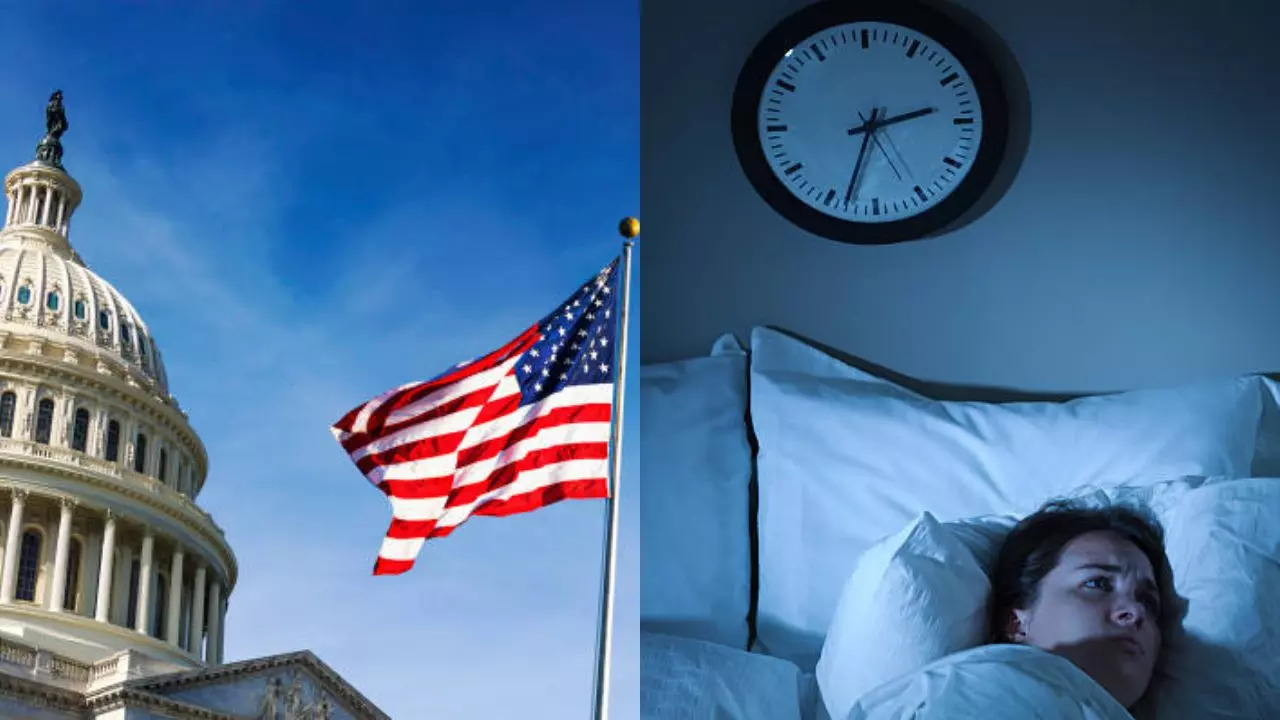Contents
-
news
-
Health
Survey shows fear of upcoming US election keeps Americans up at night
Nearly one in five Americans is losing sleep due to worry and stress over the upcoming US presidential elections. According to a survey conducted by the National Sleep Foundation, more than 17 percent of America’s adults – approximately 45 million Americans – are stressed. While their lack of sleep is equally low across political parties, the survey said most people sleep less on weekends and have worse sleep quality overall. Read on to know the side effects.

Sleep experts say that anxiety and sleeplessness are linked because people who have anxiety problems get less sleep and people who do not sleep well are more likely to have anxiety.
According to a survey by the National Sleep Foundation, more than 17 percent of American adults—about 45 million Americans—are stressed, saying the upcoming presidential election has negatively impacted their sleep. The survey found that people sleep less on weekends and have poorer sleep quality overall. The results showed that the 2024 presidential election had a negative impact on sleep across all groups, including political party affiliation.
“The dynamics of stressful social events such as elections and election day can adversely affect the public’s mood and, in turn, sleep health, which is critical to health and well-being,” said Joseph Dzierzewski, senior vice president of research and scientific affairs at National ” The Sleep Foundation (NSF) said in an NSF news release. “This reinforces the importance of paying attention to sleep health during periods of high stress.”
Anxiety and sleep are interdependent
According to sleep experts, anxiety and insomnia are linked to each other. People who have anxiety problems get less sleep and people who do not sleep well are more likely to have anxiety.
People affected by the election are getting about 7 hours of sleep over the weekend, which is about half an hour less than those who say their sleep has not been disturbed by politics, the results showed. On a scale of 1 to 5 (1 being excellent and 5 being poor), the average sleep quality of those worried about the election was about 3.36, while the average sleep quality of those not affected by politics was 2.05.
Political parties have lost sleep
About 18 percent of Democrats say they are losing sleep over the election, compared with 17 percent of Republicans and 16 percent of independents.
NSF concluded that candidates and their advisers and campaign managers could help by considering how their messages may impact the sleep health and well-being of the American public. “For example, campaign strategies and reporting that exaggerate potentially negative election results and foster strong emotional reactions from the public may have negative impacts on sleep health, which may then lead to broader health, well-being, and safety.” There could be potential consequences on outcomes,” the report said.
The NSF said the survey included 1,364 adults across the country two months before Election Day.
effects of sleep deprivation
Studies say that not getting enough sleep impairs your mental abilities and puts your physical health at risk. Science has linked insufficient sleep to a number of health problems, from weight gain to a weakened immune system. Lack of sleep causes these problems:
Central nervous system
Your central nervous system is your body’s main information highway. Sleep is essential for it to function properly, but chronic insomnia disrupts the way your body normally sends and processes information.
You may have difficulty concentrating or learning new things.
immunity to disease
Good sleep helps make your immune system more protective and strengthens infection-fighting substances like antibodies and cytokines. It uses these substances to fight foreign invaders such as bacteria and viruses. However, lack of sleep prevents your immune system from building its strength.
digestive system
Lack of sleep can make you overweight and obese. Sleep affects the levels of two hormones, leptin and ghrelin, which regulate feelings of hunger and fullness. Lack of sleep can make you feel tired even while exercising and less physical activity can lead to weight gain and digestive problems.
cardiovascular system
Adequate sleep makes your heart and blood vessels healthy in addition to controlling blood sugar levels, blood pressure and inflammation levels. However, if you don’t take enough naps, you are likely to develop cardiovascular diseases, including the risk of heart attacks.
Get the latest news live on Times Now with breaking news and top headlines from around the world.


